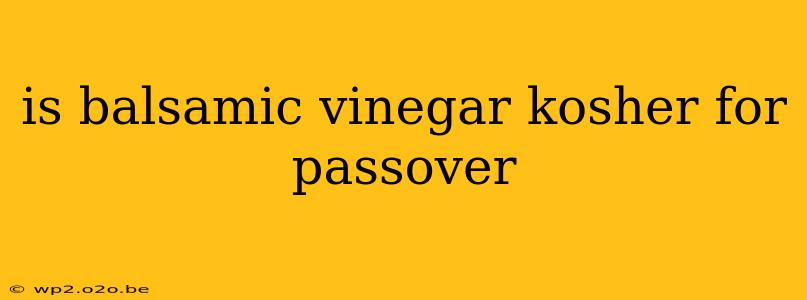Is Balsamic Vinegar Kosher for Passover? A Comprehensive Guide
The question of whether balsamic vinegar is kosher for Passover is more nuanced than a simple yes or no. It depends heavily on the ingredients and the production process. This guide will break down the complexities and help you make informed choices for your Seder and beyond.
Understanding the Kosher for Passover Certification
To be definitively deemed kosher for Passover, a product must receive certification from a reliable kosher certifying agency. This agency verifies that the ingredients and the manufacturing process adhere to the strict dietary laws of Passover, including avoiding chametz (leavened grains like wheat, barley, rye, oats, and spelt). Look for the symbol of a reputable agency on the bottle; different agencies use different symbols.
The Challenges with Balsamic Vinegar
The potential issues with balsamic vinegar's Passover suitability stem from several factors:
- Ingredients: Traditional balsamic vinegar is made from grape must (unfermented grape juice) which is generally considered kosher. However, some commercial balsamic vinegars may contain added sugars, thickeners, or other additives that could be derived from chametz-containing grains. Always check the ingredient list carefully.
- Processing and Equipment: The manufacturing process needs to be scrutinized. Equipment used for the production of balsamic vinegar might also have been used to process products containing chametz. A kosher certification ensures that the equipment has been thoroughly cleaned and dedicated for Passover production.
- Wine-Based Vinegars: Some balsamic vinegars may contain wine, which, depending on the production and certification, may or may not be acceptable during Passover. This is an important point to consider, especially for stricter interpretations of Passover dietary laws.
How to Choose Kosher for Passover Balsamic Vinegar:
- Check the Label: The most crucial step is to carefully examine the label. Look for a clear and prominent kosher for Passover certification symbol from a trusted agency. Don't rely solely on a statement saying "kosher"; ensure it specifies "kosher for Passover."
- Read the Ingredients List: Thoroughly review the ingredients list. Avoid any vinegars containing ingredients you suspect might be derived from chametz grains or if you are unsure about their origin or processing.
- Contact the Manufacturer: If you're unsure about a specific brand or have questions about the production process, don't hesitate to contact the manufacturer directly. They should be able to provide you with detailed information about their kosher certification and production practices.
Alternatives for Passover:
If you're unable to find a certified kosher for Passover balsamic vinegar, you can consider alternatives like:
- Red Wine Vinegar: Many red wine vinegars are readily available with kosher for Passover certification.
- Apple Cider Vinegar: This is a common alternative, offering a different flavor profile. Make sure to check for a kosher for Passover certification if needed.
Conclusion:
While traditional balsamic vinegar can be kosher for Passover, it's essential to verify its certification and ingredient list before using it during the holiday. Always prioritize products bearing the kosher for Passover certification symbol from a reputable agency. By carefully checking labels and understanding the potential issues, you can ensure a delicious and kosher Passover Seder.

